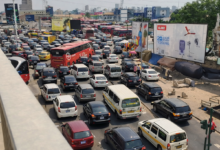Distribution of ambulances to delay – Finance Minister

Ghanaians may have to wait a little longer for the distribution of the 307 ambulances procured by government under its one million per constituency policy.
Finance Minister, Mr Ken Ofori Atta, while presenting the 2020 Budget Statement and Economic Policy budget in Parliament on Wednesday indicated that the procured ambulances would be distributed to various districts nationwide.
But, Health Minister Kwaku Agyeman-Manu, in a media interview yesterday to inaugurate the “ORBIS Flying Eye Hospital” in Accra, disclosed that only 98 out of the 307 ambulances have arrived in the country and distribution can only begin when the country receives the full complement.
Failing to put timelines to when all ambulances will arrive in the country, the minister pleaded that “Ghanaians should exercise a little patience. We are still receiving them in batches so we may have to hesitate a little in the distribution but in case of any emergency, we will be able to deploy to save the situation.”
“We expect to have the full complement soon, have the President commission them, then we can start distribution,” he said.
Government in its 2016 manifesto, promised to provide ambulances for all 275 constituencies across the country to revamp the country’s ailing emergency services.
Currently, Ghana can boast of 55 ambulances, most in poor conditions, serving the 29 million population across all regions.
Many of the 130 ambulance service stations in the country are said to be working without a functioning ambulance.
Per available statistics, the Greater Accra Region has the highest allocation of the resource, with nine ambulances serving in the region, while the Central Region has the least number of two with the data showing that one ambulance is shared by over 52,000 Ghanaians.
The National Ambulance Service (NAS) in a recent media interview had pleaded with government to distribute the ambulances that had arrived in the country to augment the present fleet.
Expressing satisfaction over the standard of the ambulances having been involved in the procurement processes, the Service prayed the vehicles are released as soon as possible.
“We do not know when we will take delivery of them. We understand they are coming in batches, so I do not know when it will be handed over to us, but if government says because of the inadequate ambulances we have now, they will give them to us as they come in, we will be happy to work with them.”
“As at now, we have 55 weak ambulances nationwide which are over stressed and some in poor conditions and have to be serviced time and again, which means that at a point in time, less than the number we have can perform emergency services,” the Public Relations Officer of NAS, Simmons Yussif Kewura had stated.
BY ABIGAIL ANNOH






